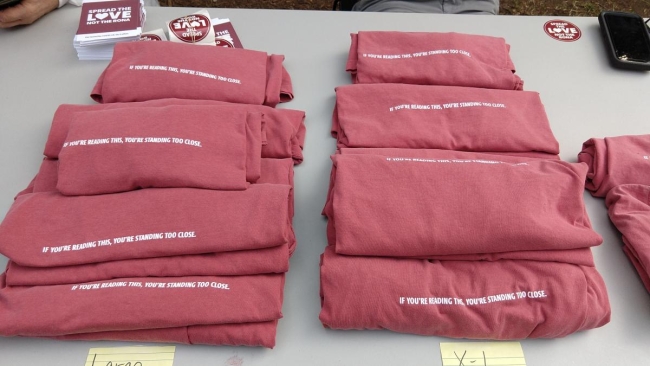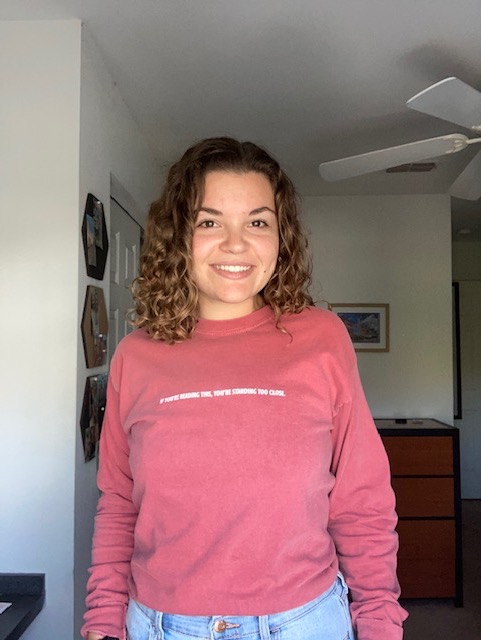You have /5 articles left.
Sign up for a free account or log in.

Students at the University of South Carolina will receive a free T-shirt if they participate in random COVID-19 testing.
University of South Carolina
Now that students are back on some college campuses and settled into the fall semester, early efforts to keep them vigilant about staying healthy and coronavirus-free during the pandemic are losing steam.
Infection reduction and monitoring strategies that are heavily promoted by institutions just aren't cutting it anymore. Students are already tired of being constantly reminded by emails and signs all over their campuses that this is not a normal college year, and they're badly missing the ordinary routines that used to be part of the college experience. College administrators and student activities officials are reaching back to classic student engagement tactics, such as gift freebies and prize giveaways, to encourage students to participate in COVID-19 testing and screening and to stay motivated about their institutions' efforts to prevent infection outbreaks.
Stephen Cutler, dean of the University of South Carolina College of Pharmacy, said students on the campus in Columbia are experiencing “testing fatigue” due to how often they are encouraged to participate in voluntary COVID-19 tests. Cutler said university health, student affairs, athletics officials and student body leaders responded by collaborating with President Robert Caslen’s office to offer prizes to students who randomly get tested.
A random sample group of students at the college is selected each week and sent an email saying they will receive a free COVID-themed university T-shirt and entered into a raffle for larger prizes if they get tested. Faculty and staff members can also pick up a T-shirt for getting tested, but only students in the sample group are entered to win prizes, Dana Woodward, a spokeswoman for the university, said in an email. The University of Kentucky implemented a similar prize program last month for students who consistently complete a daily health screening for COVID-19 symptoms. They are then entered into drawings for gift cards and university swag.
The USC College of Pharmacy is administering a rapid, “noninvasive” diagnostic test of saliva samples at various sites on campus. Students who are not experiencing symptoms of the virus but want to be tested are encouraged to do so as part of the university's overall screening for the coronavirus to determine its prevalence on campus, Cutler said. The university also offers other testing options on campus for students, faculty and staff members, such as nasal swab tests, or tests for coronavirus antibodies.
“Our approach is strictly voluntary,” Cutler said. “I like it being voluntary. I like to believe people do the right thing … By taking responsibility and getting tested, it shows that they understand the spread of the virus and want to do their part.”
Still, university officials figured a little inducement couldn't hurt, especially after they saw a drop-off in the number of tests performed since the beginning of the semester in August. The college administered about 1,500 tests daily back then, but the number had fallen to 250 to 300 tests during the first week of October, Cutler said. The university has 27,275 undergraduate students at its flagship campus, according to fall enrollment data.
To address this drop-off, the university introduced new incentives for getting tested last week. Nearly 4,000 students will be randomly invited via email each week in October to get tested and receive a free university T-shirt. Students that participate are also automatically entered into a drawing for larger prizes, such as tickets to a university football game, a tour of President Caslen’s home and a free meal plan for the spring 2021 semester, Cutler said.
Cutler said there was a noticeable impact just a week after the incentives were introduced -- the number of students tested shot up to 850 on Oct. 8 alone.
 Audrey Shahan, a junior, was tested on Oct. 7 after her roommate told her about the free T-shirts. Shahan was already going to try and get tested before going home to Vermont for the weekend, but she said the incentives drove her to get it done. She's particularly interested in tickets to a Gamecocks game; seating at the football stadium on campus is limited at about 25 percent of its normal capacity this season because of social distancing requirements, and the tickets are highly coveted even during a typical year.
Audrey Shahan, a junior, was tested on Oct. 7 after her roommate told her about the free T-shirts. Shahan was already going to try and get tested before going home to Vermont for the weekend, but she said the incentives drove her to get it done. She's particularly interested in tickets to a Gamecocks game; seating at the football stadium on campus is limited at about 25 percent of its normal capacity this season because of social distancing requirements, and the tickets are highly coveted even during a typical year.
“For a lot of people, college is just kind of a hard time financially, so any time that free clothing, free tickets, free food especially, is offered, I think there’s just a general desire to go and get that thing,” Shahan said. “Getting offered tickets is a big deal because a lot of people are missing that experience right now.”
The University of Texas at Austin will enter students who get tested for COVID-19 into a weekly raffle for $50 gift cards to vendors such as Starbucks, a local grocery store and the university's co-op, Michael Godwin, director of the UT Proactive Community Testing program, said in an email.
University officials set a goal at the beginning of the fall semester to test 5,000 students, faculty and staff members each week, but they have only tested an average of 2,743 each week since the beginning of September, J. B. Bird, director of media relations, said in an email. Voluntary testing rates among both students and faculty members have been lower than anticipated, the university's Faculty Council noted in a recent memo encouraging colleagues to be tested for COVID-19 “every couple of weeks” and to relay the message to their students.
“We have fewer than 5,000 people a week who have been willing to take the tests,” the memo said. “Please urge your students to participate (and join them!).”
University officials have begun to see "steady growth" in testing, and the new incentive was launched last week to help accelerate the increase, Godwin wrote.
In a similar fashion, officials at the University of Kentucky are tapping into a popular pastime among students -- hanging out in hammocks in green spaces -- to incentivize students to record any possible symptoms of COVID-19 in a phone application each day. Students who reach 90 percent completion or higher on their UK Wellness Review each month will be entered into a random drawing for prizes, including 20 nylon hammocks with the UK logo and 30 $5 gift cards for coffee, according to a university press release.
Julie Balog, chief marketing officer, said the giveaway goes hand in hand with the “hammock gardens” set up around the campus before the start of the semester to provide more designated spaces for hanging out and to encourage students to socialize outdoors, where the coronavirus is less likely to spread.
Balog said the completion rate of the daily screening tool has remained around 70 percent since the semester began. University officials knew it would be relatively easy for students to fill out the application -- it takes 30 seconds to two minutes to complete -- but getting students to make a daily habit of it would be harder, she said. In September, the first month that the incentive was offered, there was no significant change in completion rates, but Balog said she is hopeful this will change.
“We saw steady continued adherence, maybe a little bit of an uptick, but the idea that we’re doing the positive reinforcement of the good habit is just really important,” Balog said.
Balog said the hammock gardens were part of university president Eli Capilouto’s vision to encourage safe habits among students and offer them alternative ways to socialize. This is a perspective shared by epidemiology and public health experts, who have been urging colleges to share positive and encouraging messages with students about their role in stopping the spread of the virus.
Several of these experts applauded the efforts by colleges to positively reinforce testing and screening habits among students. Stefan Baral, a professor of epidemiology at the Johns Hopkins University Bloomberg School of Public Health, said the ideas for the incentives resulted from consulting with students about ways to best address their needs and behaviors. This is “public health 101” and an important step in developing intervention strategies, Baral said.
But the incentive strategies are only as effective as the messaging that accompanies them, Baral said. Colleges would be better off “if we had started with the framing of how do we best ensure this is an intervention that people would engage with” when they were developing return-to-campus plans, he said.
“Would it have been more impactful to start positive interventions earlier? The answer is yes,” he said.
While there are likely many colleges taking a similar approach to coronavirus control on their campuses, news media and public attention has been more focused on suspensions and other punitive measures against students who violate social distancing rules, Baral said. Students following these developments on social media may be discouraged from participating in mitigation efforts if they only see peers being punished for noncompliance or removed from their dorm due to a COVID-19 infection, he said. They can also experience “COVID fatigue” and become desensitized to their colleges' frequent alerts about the virus, he said.
“If I were a student on a university campus right now, I’d be afraid,” Baral said. “That doesn’t promote engagement in public health interventions … When we don’t create that environment, we don’t only run the risk of more outbreaks, but we don’t create an environment of positive engagement with students.”








